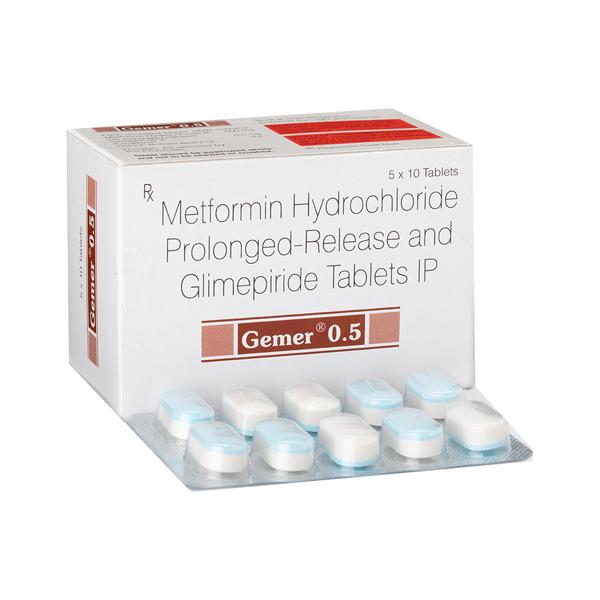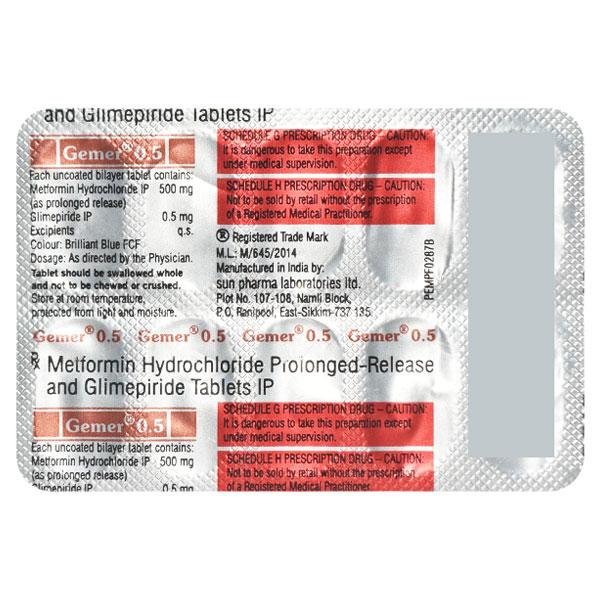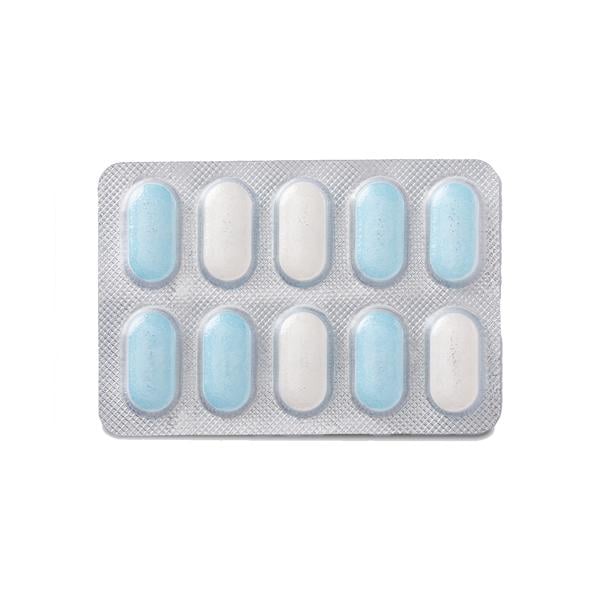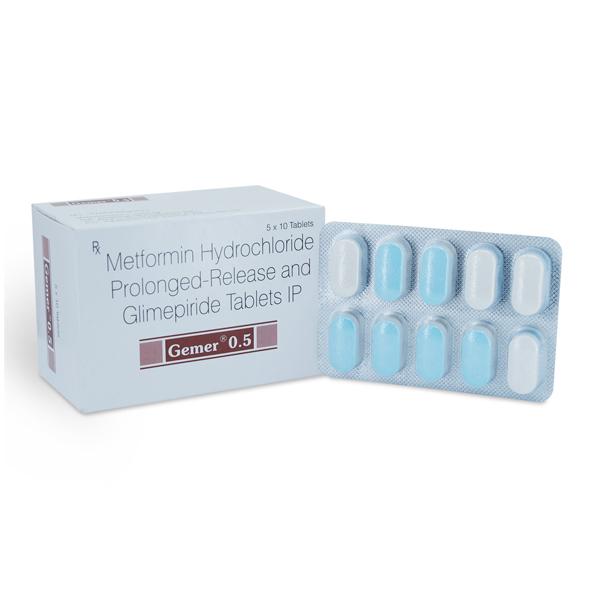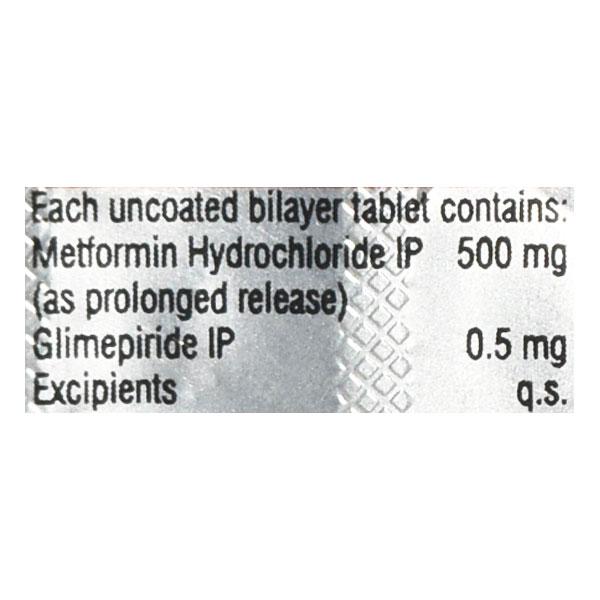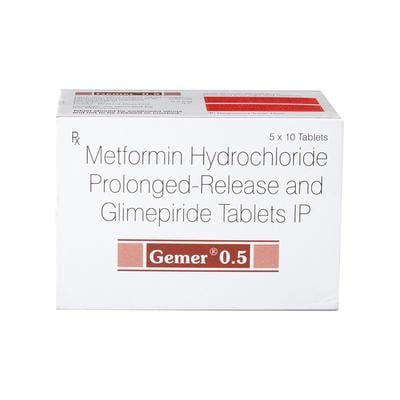

Netmeds First Membership
Quick Links
Introduction About GEMER 0.5MG TABLET
Gemer 0.5mg Tablet is a fixed-dose combination containing Glimepiride and Metformin formulated to support healthy blood sugar levels in adults managing type 2 diabetes. This combination works with the body's natural insulin response and cellular glucose usage. It is often considered when lifestyle adjustments like diet and physical activity alone do not provide sufficient support.
This tablet supports post-meal glucose regulation by stimulating insulin secretion (via Glimepiride) and improving cellular glucose utilization (via Metformin), while also helping to minimize excess glucose production in the liver. Patients with overweight-related blood sugar imbalance or insulin resistance may benefit from this combination, under professional guidance.
Gemer 0.5mg is usually taken once daily with a main meal preferably breakfast to support the body’s natural glucose response and reduce the chance of gastric discomfort. It is important to follow the dosage as advised by your healthcare provider. Avoid skipping meals when taking this tablet as doing so may lead to a drop in sugar levels. Alcohol intake, sudden fasting and high-intensity exercise without appropriate nutrition should also be approached cautiously while on this medication.
Commonly reported side effects may include nausea, mild stomach upset or dizziness, particularly when starting therapy. If symptoms persist or worsen, consult your doctor. Gemer 0.5mg is not usually recommended during pregnancy or while breastfeeding unless advised by a healthcare professional after weighing benefits and risks. Individuals with kidney, liver, or heart-related conditions should disclose their medical history before starting this tablet. Regular monitoring of blood sugar levels, kidney function, and diet is advised during continued use.
Uses Of GEMER 0.5MG TABLET
- Used in the management of type 2 diabetes
Benefits of GEMER 0.5MG TABLET
Supports insulin release by acting on pancreatic cells
The Glimepiride component in Gemer 0.5mg plays a role in stimulating insulin secretion from the pancreas particularly from the beta cells. This helps the body respond more effectively to meals by making insulin available when needed, especially after eating. Supporting natural insulin release allows smoother control over blood sugar levels during the day.
Enhances the body's ability to use glucose effectively
The Metformin component in Gemer 0.5mg helps improve the way the body processes glucose. It enhances insulin sensitivity, which means the muscles and tissues can absorb and utilize sugar from the bloodstream more efficiently. This helps avoid unnecessary buildup of sugar in the blood, supporting energy production and metabolic balance.
Reduces excess sugar production in the liver
Metformin also acts on the liver to help regulate the amount of glucose it produces—especially between meals and during fasting states. By limiting unnecessary glucose output, it helps in maintaining more consistent blood sugar levels. This mechanism complements insulin release and glucose uptake, making it an important part of overall glucose balance support.
How GEMER 0.5MG TABLET Works
How Gemer 0.5mg Supports Daily Glucose Balance
Gemer 0.5mg Tablet combines two well-known compounds—Glimepiride and Metformin—that work together to support glucose balance throughout the day. This dual-action formula addresses multiple aspects of blood sugar regulation by encouraging natural insulin release and enhancing how the body uses and stores glucose. Taken once daily with a main meal, Gemer 0.5mg offers structured support for individuals seeking help with maintaining steady energy and glucose levels as part of a balanced routine involving diet and physical activity.
How Metformin Enhances Cellular Glucose Utilization
Metformin, one of the active components in Gemer 0.5mg, plays a key role in improving the way the body responds to insulin. It helps cells particularly muscle and fat tissue absorb glucose more efficiently from the bloodstream. This process contributes to better glucose utilization and helps minimize excess sugar in circulation. Metformin also works on the liver to reduce the amount of glucose produced between meals, supporting a more stable daily glucose pattern.
Role of Glimepiride in Stimulating Natural Insulin Release
Glimepiride is a sulfonylurea agent in Gemer 0.5mg that helps the pancreas respond to elevated blood sugar especially after meals. It encourages the beta cells of the pancreas to release insulin only when needed, in a way that complements the body’s natural rhythm. This action supports post-meal glucose control and works synergistically with Metformin to help the body manage daily sugar intake and output more effectively.
How to use GEMER 0.5MG TABLET
Recommended Dosage and Timing for Gemer 0.5mg
- Usually taken once daily, as per healthcare provider’s guidance.
- Best taken at the same time each day to maintain consistent blood sugar levels.
- Dosage may be tailored based on age, lifestyle, and blood glucose monitoring.
- Commonly started at a lower dose to assess tolerance and effectiveness.
- Always follow your doctor's instructions—do not self-adjust the dosage.
- Regular glucose tracking is advised to evaluate how well the dosage is working.
Should Gemer Be Taken Before or After Meals?
- Gemer 0.5mg should be taken with food, typically during the first main meal of the day.
- Taking the tablet with meals minimizes stomach upset, especially from Metformin.
- Glimepiride component works best when taken just before or with food to match insulin needs.
- Helps support post-meal glucose balance effectively.
- Avoid taking the tablet on an empty stomach to reduce the chance of low blood sugar (hypoglycemia).
What if I forgot to take GEMER 0.5MG TABLET
If you accidentally miss a dose of Gemer 0.5mg, it is generally advised to take it as soon as you remember—ideally with food. However, if the time is close to your next scheduled dose, it's best to skip the missed one and continue with your regular dosing schedule. Doubling up on doses to make up for a missed one is not recommended as it may increase the risk of low blood sugar (hypoglycemia). If you miss a dose, it's helpful to monitor your blood glucose levels more closely and maintain a consistent daily routine to reduce the chances of missing future doses.
Overdose
Taking more than the prescribed dose of Gemer 0.5mg may result in an excessive drop in blood sugar levels. Common signs of overdosage include sweating, trembling, dizziness, rapid heartbeat, and confusion. In more severe cases, it may lead to fainting or loss of consciousness, which requires immediate medical attention. If you suspect an overdose—whether accidental or intentional—contact a healthcare provider or emergency services promptly. It’s important to follow dosage instructions closely and store the medication safely to avoid accidental intake, especially by children or older adults.
Side Effects Of GEMER 0.5MG TABLET
Common side effects of GEMER 0.5MG TABLET:
- taste disturbance
- diarrhea
- stomach pain
- loss of appetite
When to Seek Medical Attention?
Stop taking GEMER 0.5MG TABLET and contact your doctor immediately if you experience any of the following side effects:
- lactic acidosis
- inflammation of the liver which may result in jaundice (yellowing of skin or eyes)
- severe allergic reactions (such as skin rash, hives, and increased sensitivity to sun, inflammation of blood vessels which may develop into serious reactions with difficulty in breathing, fall in blood pressure and sometimes progressing to shock)
- severe low blood sugar levels
How To Manage Side Effects
Diarrhea
- Stay well-hydrated by drinking plenty of fluids such as water or electrolyte solutions.
- Avoid high-fiber, greasy, or spicy foods which can worsen diarrhea.
- Consume bland meals like rice, applesauce, and toast to support digestion.
- Monitor your stool frequency and consistency; report prolonged symptoms to your doctor.
Stomach Pain
- Eat smaller, frequent meals to reduce digestive stress.
- Avoid foods that trigger acidity or bloating such as caffeine, carbonated drinks or heavy meals.
- Apply a warm compress on your abdomen for mild cramping or discomfort.
- Ask your doctor if antacids or digestive enzymes are safe to take alongside your medication.
Warning & Precautions
Pregnancy
ContraindicatedGEMER 0.5MG TABLET should not be taken during pregnancy. Consult your doctor before taking GEMER 0.5MG TABLET if you are planning to become pregnant.
Breastfeeding
ContraindicatedGEMER 0.5MG TABLET should not be taken during breastfeeding as it may pass through breast milk.
Driving and Using Machines
Use with CautionDo not drive or handle any machines if you experience low or high blood sugar levels (symptoms include dizziness, tiredness, shaking or trembling) or if you develop visual problems due to altered blood sugar levels.
Alcohol
Consult your doctorAvoid consumption of alcohol during management with GEMER 0.5MG TABLET as it may increase or decrease the blood sugar lowering action of GEMER 0.5MG TABLET and increases the risk of lactic acidosis.
Kidney
Consult your doctorGEMER 0.5MG TABLET is not recommended for use in patients with severe kidney disease and it should be used with caution in patients with kidney disease and your dose will be adjusted if needed depending upon kidney function.
Liver
Consult your doctorGEMER 0.5MG TABLET is not recommended if you have severe liver disease and it should be used with caution in patients with liver disease and your dose will be adjusted if needed depending upon liver function.
Allergy
ContraindicatedDo not take GEMER 0.5MG TABLET if you are allergic (hypersensitive) to Glimepiride or Metformin or other sulfonylureas (such as glipizide, glibenclamide) or sulfonamides (such as sulfamethoxazole).
Heart Disease
ContraindicatedGEMER 0.5MG TABLET is not recommended for use in patients with acute heart problems or recently had a heart attack or have severe circulatory problems or breathing difficulties (signs of heart failure).
Use In Pediatrics
ContraindicatedGEMER 0.5MG TABLET is not recommended for use in children and adolescents (under 18 years of age).
Use In Geriatrics
Consult your doctorGEMER 0.5MG TABLET is not recommended for use in elderly patients (aged 75 years or above) and it should be used with caution in elderly patients (aged 65 years or above), especially in patients with impaired kidney function. Your doctor may assess your kidney function more frequently during management with GEMER 0.5MG TABLET.
Other Warnings for GEMER 0.5MG TABLET
Before taking GEMER 0.5MG TABLET inform your doctor if you:
- are recovering from injury, operation, infections with fever, or from other forms of stress
- have glucose-6-phosphate dehydrogenase (G6PD) deficiency
- have various factors which could increase the risk of low blood sugar levels (such as undernourishment, irregular mealtime, missed or delayed meal or period of fasting, change in diet, hormone-induced disorders)
Who should not take [GBNKEYWORD
GEMER 0.5MG TABLET is not recommended for use, if you have:
- type 1 diabetes mellitus
- diabetic ketoacidosis
- uncontrolled diabetes or ketoacidosis
- dehydration
- severe infection
Safety Advice
Watch for Signs of Low Blood Sugar (Hypoglycemia)
While taking Gemer 0.5mg Tablet, especially due to the presence of Glimepiride, there is a risk of low blood sugar (hypoglycemia), particularly if meals are skipped, delayed, or if physical activity increases unexpectedly. Be alert to symptoms such as:
- Sweating or chills
- Sudden hunger
- Shakiness or dizziness
- Palpitations or rapid heartbeat
- Blurred vision or confusion
To manage mild episodes, keep a quick source of glucose, such as glucose tablets or a small sugary snack, readily available. If symptoms persist or worsen, consult a healthcare provider immediately. Regular blood glucose monitoring can help detect changes early and guide appropriate action.
Safety During Illness, Fasting or Surgery
Illness, extended fasting or undergoing surgical procedures can impact blood sugar levels and how the body responds to medications like Metformin and Glimepiride. During these times, the risk of lactic acidosis (a rare side effect of Metformin) may increase, especially if dehydration or kidney stress is present.
- During Illness: Stay well-hydrated and monitor blood glucose frequently. Seek medical advice before continuing or adjusting your dose.
- Fasting (e.g., religious or therapeutic): May require dose modification to prevent hypoglycemia. Always discuss fasting plans with your doctor in advance.
- Before Surgery: Inform your surgical and anesthesia team that you are taking Gemer. The medication may need to be temporarily paused before and after the procedure, depending on your condition.
Consult your healthcare provider during these events for specific instructions to ensure safe and effective use.
Diet and Lifestyle Advice
Dietary Guidelines
- Balanced Meals: Include whole grains, lean proteins, healthy fats and fiber-rich vegetables to support gradual glucose absorption.
- Regular Meal Timing: Avoid skipping meals, especially when taking Glimepiride, to reduce the risk of low blood sugar (hypoglycemia).
- Limit Sugary Foods: Minimize intake of refined sugars, sweetened beverages, and desserts that can cause rapid glucose spikes.
- Control Portion Sizes: Practice mindful eating and maintain appropriate portion sizes to manage weight and glucose balance.
- Stay Hydrated: Drink adequate water throughout the day, unless otherwise advised by your doctor.
Lifestyle Tips
- Stay Active: Aim for at least 30 minutes of moderate physical activity (e.g., walking, yoga, cycling) most days of the week to enhance insulin sensitivity.
- Monitor Blood Glucose: Track blood sugar levels as advised by your healthcare provider to understand how your body responds to food and medication.
- Manage Stress: Practice stress-relief techniques like meditation, deep breathing, or gentle movement to avoid stress-induced glucose fluctuations.
- Limit Alcohol: If consumed, alcohol should be taken in moderation and with meals to prevent hypoglycemia and reduce the risk of lactic acidosis (linked to Metformin).
- Sleep Well: Prioritize 7–8 hours of quality sleep nightly to support metabolic health and blood sugar regulation.
Drug - Drug interaction
Gemer 0.5mg Tablet may interact with other drugs, which can influence its effectiveness or increase the risk of side effects. Understanding potential drug interactions is essential for maintaining stable glucose levels and ensuring safe use.
1. Other Antidiabetic Medications
- Interaction: Combining with insulin or other oral antidiabetics may increase the likelihood of low blood sugar.
- Management: Regular glucose monitoring is advised; dosage adjustments may be required based on clinical response.
2. Beta-Blockers (e.g., Atenolol, Metoprolol)
- Interaction: These may mask signs of low blood sugar such as rapid heartbeat, making hypoglycemia harder to detect.
- Management: Patients should be educated to recognize other symptoms like sweating or dizziness.
3. Diuretics (Thiazides and Loop Diuretics)
- Interaction: May reduce the glucose-lowering efficacy of Gemer, possibly leading to elevated glucose levels.
- Management: Blood sugar levels should be checked regularly; dosage modification might be considered.
4. ACE Inhibitors (e.g., Ramipril, Lisinopril)
- Interaction: May enhance the blood sugar-lowering effects, raising the risk of hypoglycemia.
- Management: Glucose levels should be monitored more frequently, especially when initiating or adjusting ACE inhibitors.
5. Corticosteroids (e.g., Prednisone, Dexamethasone)
- Interaction: These may counteract Gemer’s action by increasing blood glucose levels.
- Management: Regular glucose monitoring and potential dose adjustments of Gemer may be necessary.
6. Fluoroquinolone Antibiotics (e.g., Ciprofloxacin)
- Interaction: These may alter glucose metabolism, increasing the risk of both hyperglycemia and hypoglycemia.
- Management: Blood glucose should be checked more frequently during antibiotic therapy.
7. Thyroid Hormones (e.g., Levothyroxine)
- Interaction: Can decrease the blood glucose-lowering effect of Gemer.
- Management: Glucose levels should be reevaluated if thyroid therapy is initiated or modified.
8. NSAIDs (e.g., Ibuprofen, Naproxen)
- Interaction: May increase the glucose-lowering effects, especially when used long-term.
- Management: Monitor blood sugar levels during concurrent use and adjust doses if necessary.
9. Antipsychotics (e.g., Olanzapine, Risperidone)
- Interaction: May cause elevated blood sugar levels and reduce Gemer’s efficacy.
- Management: Periodic glucose testing is recommended, especially in patients with known risk factors.
Drug - Food interaction
Gemer 0.5mg Tablet is commonly taken with meals to improve tolerability, certain foods and eating patterns can influence its effectiveness or risk of side effects. Understanding these interactions helps support consistent glucose control and minimize discomfort.
1. High-Fat Meals
- Interaction: Taking Gemer with a high-fat meal may delay the absorption of Metformin which could affect how quickly it begins working.
- Management: Prefer balanced meals with moderate fat content; consistent meal timing improves stability in glucose response.
2. Excessive Alcohol Consumption
- Interaction: Alcohol may amplify the risk of lactic acidosis, a rare but serious condition linked with Metformin, and can unpredictably alter blood sugar levels.
- Management: Avoid binge drinking and limit alcohol intake. If alcohol is consumed, it should be in moderation and with food.
3. Skipped or Irregular Meals
- Interaction: Skipping meals while on Glimepiride can increase the risk of hypoglycemia (low blood sugar).
- Management: Maintain a regular eating schedule and avoid long gaps between meals to reduce the risk of sugar dips.
4. Sugary or High-Glycemic Foods
- Interaction: Foods with high sugar content can spike blood glucose levels, reducing the overall effectiveness of Gemer.
- Management: Choose complex carbohydrates with low glycemic index and fiber-rich meals to support glucose balance.
5. Caffeine (Coffee, Tea, Energy Drinks)
- Interaction: While not directly interfering with Gemer, excessive caffeine may trigger stress responses that temporarily raise blood sugar.
- Management: Moderate caffeine intake and monitor for any unusual changes in blood glucose levels.
Synopsis
| Drug | : | Glimepiride, Metformin |
| Pharmacological Category | : | Sulfonylureas, Biguanides |
| Therapeutic Indication | : | Type II diabetes mellitus |
| Dosage Forms | : | Tablet |
More Information
Is Gemer better than taking Metformin or Glimepiride alone?
Gemer 0.5 mg Tablet combines two well-established medicines—Metformin and Glimepiride—into a single treatment option, which can offer benefits beyond taking either medication alone. Metformin primarily works by improving the body’s response to insulin and reducing glucose production in the liver, while Glimepiride stimulates the pancreas to release more insulin. Together, they target blood sugar control from different angles, potentially providing more balanced and effective glucose management.
For many patients with type 2 blood sugar imbalance, especially those who do not achieve desired results with just one medication, Gemer’s combination approach may help improve overall glucose levels more efficiently. However, the choice between combination therapy and single-drug treatment depends on individual health factors, blood sugar targets, and medical advice. It’s important to follow a healthcare provider’s recommendations to determine the best regimen tailored to your specific needs.
In summary, Gemer can be advantageous for those needing dual action to support blood sugar balance but should be used under medical supervision to ensure safety and effectiveness.
Gemer 0.5 mg tablet vs Glycomet SR
|
Feature |
Gemer 0.5 mg Tablet |
Glycomet SR |
|
Active Ingredients |
Glimepiride 0.5 mg + Metformin (immediate release) |
Metformin (Sustained Release/Extended Release) only |
|
Purpose |
Controls blood sugar by increasing insulin secretion and reducing glucose production |
Controls blood sugar mainly by reducing glucose production and improving insulin sensitivity |
|
Dosage Form |
Immediate-release tablet |
Sustained-release (SR) tablet |
|
Glimepiride Content |
Yes, contains Glimepiride (0.5 mg) |
No Glimepiride; only Metformin SR |
|
Metformin Release |
Immediate release |
Sustained (slow) release for better tolerance and steady effect |
|
Frequency of Dose |
Usually 1-2 times daily |
Usually once daily or as prescribed |
|
Side Effects |
Risk of hypoglycemia due to Glimepiride; GI discomfort from Metformin |
Less GI upset due to sustained release; no risk of hypoglycemia from sulfonylurea |
|
Use |
Suitable for patients needing combination therapy |
Suitable for patients requiring only Metformin, especially with GI sensitivity |
FAQs About GEMER 0.5MG TABLET
Q: What is Gemer 0.5mg Tablet used for?
A: Gemer 0.5mg Tablet is prescribed for managing type 2 diabetes mellitus in adults. It combines two medications, Glimepiride and Metformin, which work together to control blood sugar levels when diet and exercise alone are insufficient.
Q: Can I take Gemer 0.5mg Tablet on an empty stomach?
A: No, taking it on an empty stomach may increase the risk of hypoglycemia and stomach upset. Always take it with food.
Q: What are the signs of low blood sugar?
A: Symptoms include sweating, dizziness, hunger, irritability, and rapid heartbeat. Always carry a quick source of sugar, like glucose tablets or juice.
Q: Can Gemer 0.5mg Tablet cause vitamin B12 deficiency?
A: Long-term use of Metformin can lead to vitamin B12 deficiency. Regular monitoring and supplementation may be necessary.
Q: Is it safe to consume alcohol while taking Gemer 0.5mg Tablet?
A: Alcohol can increase the risk of lactic acidosis and hypoglycemia. It's advisable to limit or avoid alcohol consumption.
Q: What precautions should I take if I have kidney issues?
A: Gemer 0.5mg Tablet should be used cautiously in patients with kidney problems. Regular monitoring of kidney function is essential.
Q: Can I stop taking Gemer 0.5mg Tablet if I feel better?
A: Do not discontinue the medication without consulting your doctor, even if you feel well. Stopping abruptly can lead to uncontrolled blood sugar levels.
Q: Does Gemer 0.5mg Tablet cause weight gain?
A: Some patients may experience weight gain. Maintaining a healthy diet and regular exercise can help manage weight.
Q: Can I take Gemer 0.5mg Tablet during fasting?
A: Fasting may increase the risk of hypoglycemia. Consult your doctor for guidance on medication adjustments during fasting periods.
Q: How long does it take for Gemer 0.5mg Tablet to work?
A: It may take a few days to weeks to see the full effect. Regular monitoring of blood sugar levels helps assess its efficacy.
Q: What is lactic acidosis, and how is it related to Gemer 0.5mg Tablet?
A: Lactic acidosis is a rare but serious side effect of Metformin, characterized by muscle pain, difficulty breathing, and fatigue. Seek immediate medical attention if symptoms occur.
Q: How does Gemer 0.5mg Tablet interact with thyroid medications?
A: Thyroid medications can influence how the body processes glucose potentially affecting the effectiveness of Gemer 0.5 mg in controlling blood sugar. Hyperthyroidism may cause faster glucose metabolism, reducing Gemer's impact while hypothyroidism may enhance its effect, increasing the risk of low blood sugar. This interaction requires close monitoring of blood glucose levels. Adjustments in the dosage of either medication may be needed based on individual response
Q: How often should I monitor my blood sugar levels?
A: Follow your doctor's recommendations, which may include daily monitoring, especially when starting or adjusting the medication.
Q: Does Gemer cause low blood sugar?
A: Yes, Gemer 0.5mg Tablet can cause low blood sugar (hypoglycemia), especially because it contains Glimepiride, a sulfonylurea that stimulates insulin release. The risk increases if you skip meals, exercise heavily, or combine it with other blood sugar-lowering medications. Symptoms may include sweating, shakiness, dizziness, hunger, or blurred vision. Always carry a quick source of sugar like glucose tablets or juice to manage sudden drops in sugar levels.
References
1. KD Tripathi MD. Hormones and related drugs. Essentials of medical pharmacology. Seventh edition. New Delhi, May 2013. Page – 274.
2. Rakesh Kumar Sahay, Vinod Mittal, G Raja Gopal, Sunil Kota, Ghanshyam Goyal, Mahesh Abhyankar, Santosh Revenkar. Glimepiride and Metformin Combinations in Diabetes Comorbidities and Complications: Real-World Evidence. September 2020. [Accessed on May 27th, 2025] ![]()
3. Sanofi. Efficacy and Safety Comparison of Metformin/Glimepiride Combination Versus Each Compound Alone in New Diagnosed Type 2 Diabetes Patients (RECOMMEND). NIH U.S. National Library of Medicine. ClinicalTrials.gov. [Revised in January 2015] [Accessed on May 27th, 2025] 
4. Torrent pharmaceuticals Ltd. Azulix MF. Metformin Hydrochloride Prolonged Release and Glimepiride Tablets I.P. [Revised in July 2019] [Accessed on May 27th, 2025] 
5. Sanofi-aventis group. Amaryl M. Glimepiride + Metformin. [Revised in May 2015] [Accessed on May 27th, 2025] 











